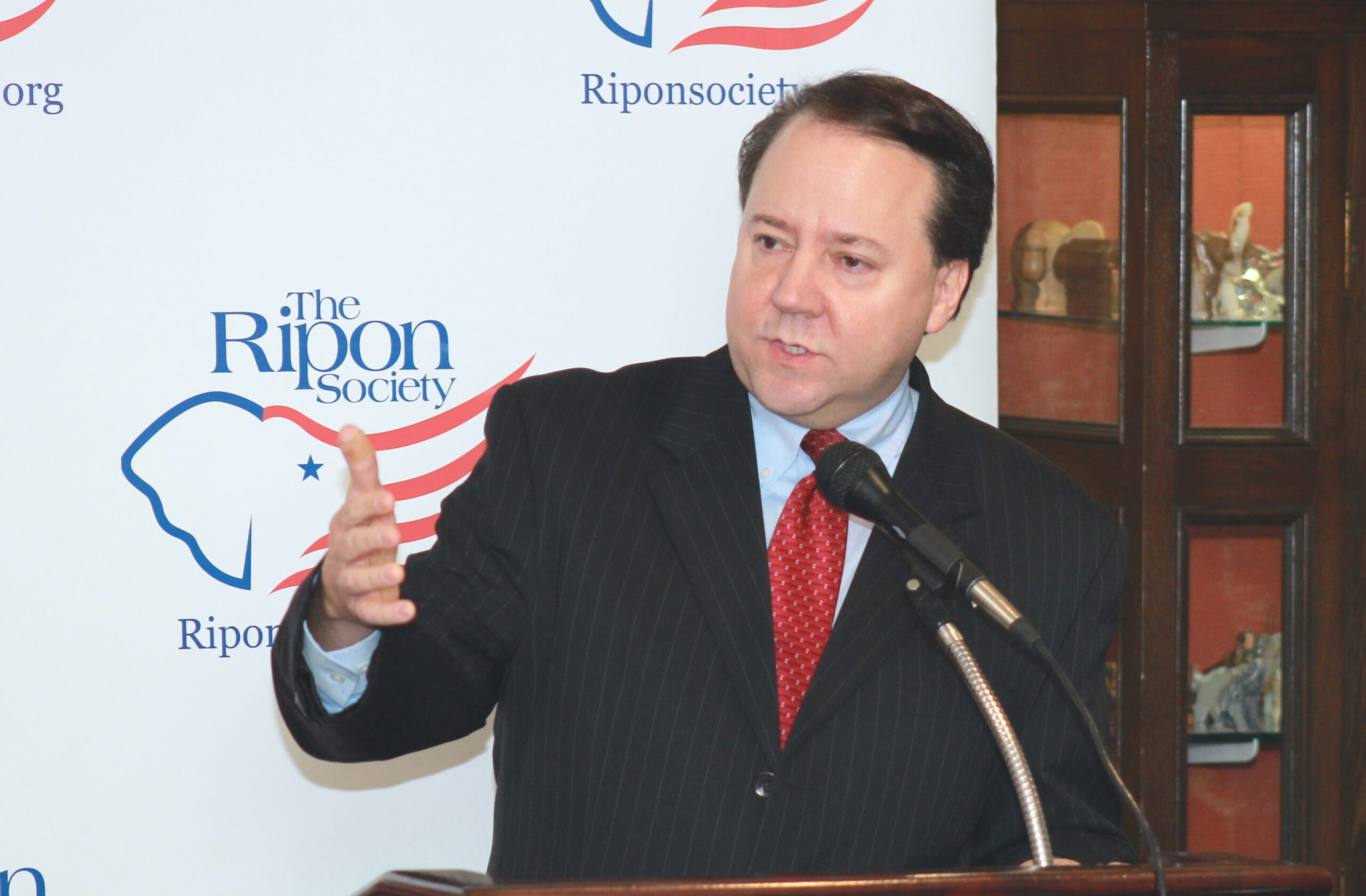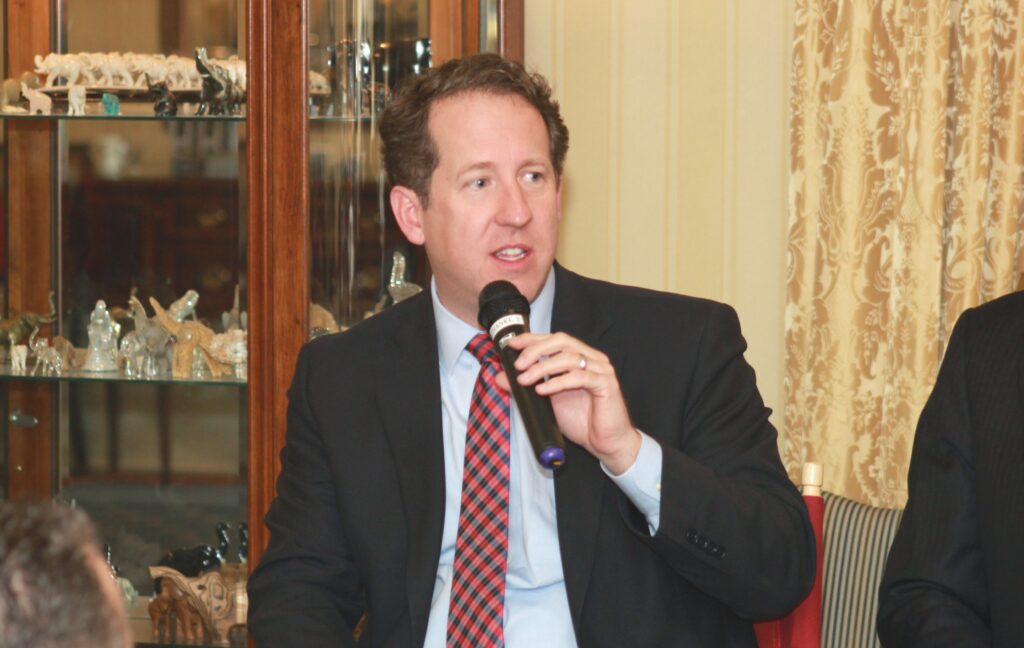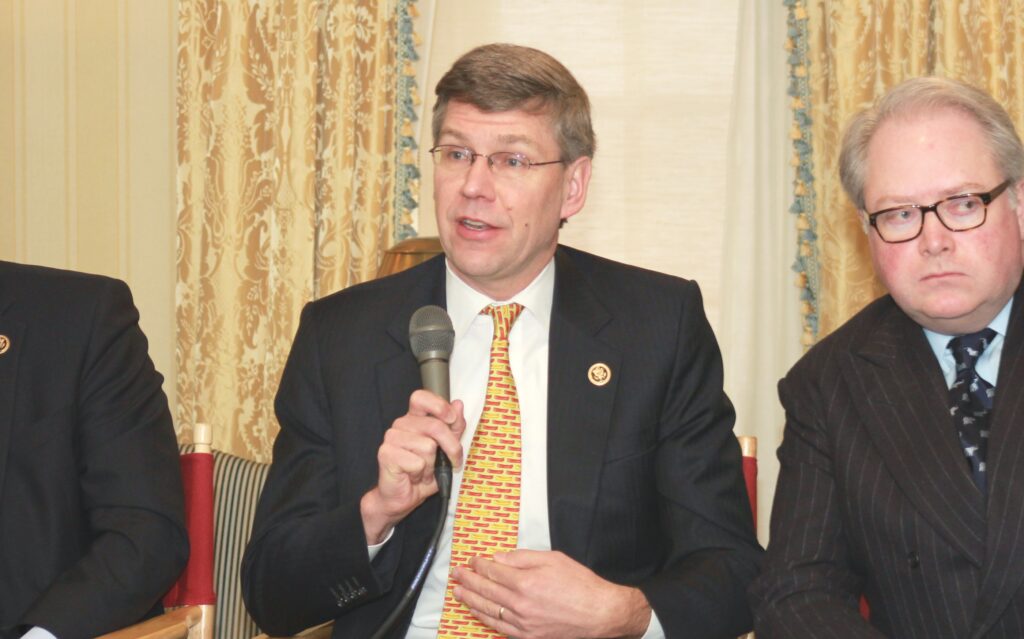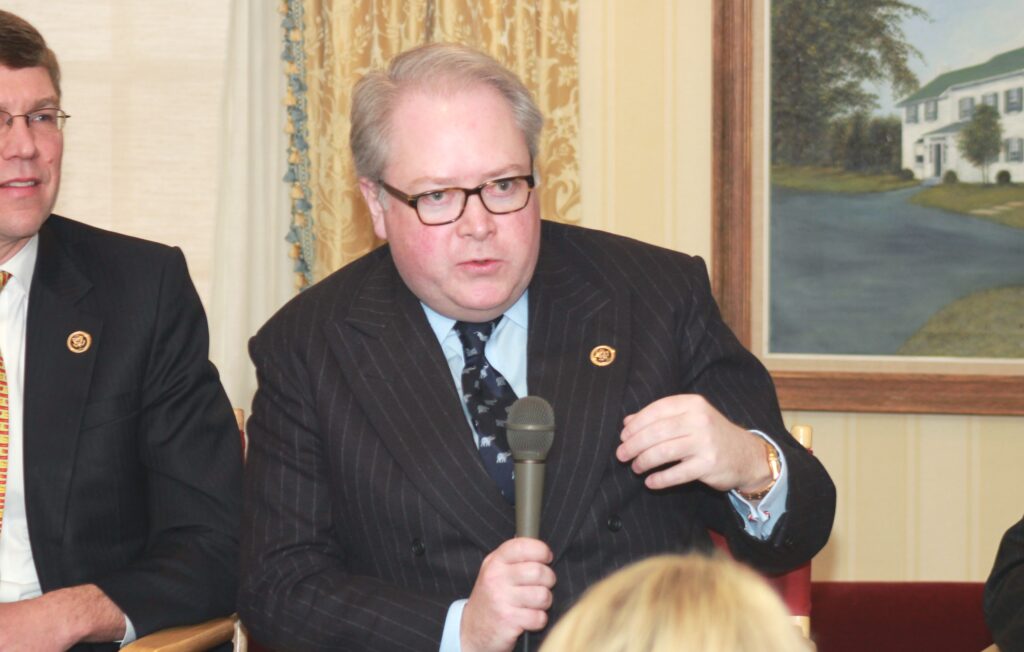 Chairman Tiberi Expresses Optimism for Trade Promotion Authority Through Bipartisanship
Chairman Tiberi Expresses Optimism for Trade Promotion Authority Through Bipartisanship
WASHINGTON, DC – Ways and Means Trade Subcommittee Chairman Pat Tiberi (OH-12) was joined by fellow committee members Adrian Smith (NE-3), Erik Paulsen (MN-3), and George Holding (NC-13) at a breakfast meeting of The Ripon Society yesterday morning, where they discussed their panel’s efforts to approve several key trade agreements and the importance of passing Trade Promotion Authority (TPA) this year.
“There’s a great opportunity on the trade agenda for us this year,” Tiberi said confidently. “There are a number of bills we have an opportunity to get across the finish line. Many of which were started by former Chairman Camp, but the lineup obviously wasn’t conducive in the Senate to get it across the finish line. The President hadn’t engaged as much as he is engaging lately over the last couple of weeks, which is all really good news.”
Noting that the last time the House approved TPA was in 2002, Tiberi remarked how few current Members were present for that vote.
“There are only four of us on the Ways and Means Committee and 28 in the House Republican Conference that were here for the last TPA vote. We won by one vote, and I still remember a former colleague of ours crying on the House floor because he voted for TPA and because I think he knew he wasn’t going to come back. And ultimately, he didn’t come back. But, he voted for it because he thought it was the right thing to do.”
“I was talking to a colleague on the floor last night about TPA and I got a classic response,” the Ohio lawmaker relayed to the crowd gathered. “‘I want to vote for it, but I’m really concerned giving the President all of this additional authority that he doesn’t have today. My tea party groups are going crazy about giving this President extra authority.’ I looked at him and said: ‘Okay, did you know that the President has the ability to negotiate any trade agreement today with whomever he wants?’ ‘Oh, he does?’ I said yes, he absolutely does! ‘I didn’t know that. I thought we were giving him some special authority.’ No, we’re not giving him any special authority, we’re giving him direction. We’re actually giving him our input, and our guidance. We’re spelling it out.
“In return for that, what we’re doing is we’re saying to him and to everyone he’s negotiating with: ‘We will give you an up or down vote.’… We have to provide some sort of commitment and certainty to the negotiators after we give them all of this direction about what we think is important within the confines of an agreement.
“A lot of our Members don’t know that…yet. Worse than that, our constituents don’t know that yet. Worse than that, there are people on the other side who work everyday to mix that message and say ‘we’re giving the President some special authority.’ That mixed message comes from the far left, and that mixed message unfortunately comes from the far right.”
Chairman Tiberi described not just the challenge of informing his Congressional colleagues of the importance of this issue, but more significantly, his constituents.
“In my local paper, the head of the AFL-CIO said trade is bad because we have a manufacturing deficit with respect to trade. What he didn’t say in the article goes back to the point of fear. With the 20 countries that we have trade agreements with, we have a manufacturing surplus. We have a services surplus. We have an agriculture surplus in trade. There’s a story to be told here that we’re not telling very well.
“I believe Americans can compete as long as the rules are fair, and that’s a huge issue. I believe Americans can compete anywhere with anyone. We can’t put our heads in the sand, and that’s what this debate is all about. The President has begun to show leadership, but he has to show more.”

Rep. Adrian Smith (NE-3) took time to discuss a recent codel to Japan and why trade agreements like the Trans-Pacific Partnership (TPP) provide more than just strong agricultural export opportunities for his home state, but larger strategic political alliances between the two countries as well.
“Ninety-Five percent of the world’s customers live outside our border. This is good for Nebraska because everyone needs to eat and our District can capitalize on that. Last week’s codel to Asia was especially productive and a good reminder of how many folks are interested in what is happening with trade and more specifically, TPP.”
“In Japan, we’ve had some challenges relating to agriculture – they’ve shut our beef out because they said it was the [Mad Cow Disease] issue and governmental politics sprinkled in with that — more than any concern for disease. In working through that, they’ve opened up a little bit and I see TPP as an opportunity to really specify that games can’t be played and science should reign supreme.”
“Across America, trade is just not the issue that is on top of folks’ minds. It’s not quite as tangible. But when you look at the geopolitical impact that trade can have and where commercial partnerships are established – political partnerships follow suit. Stronger and more stable relationships are built.”

Minnesota Congressman Erik Paulsen (MN-3), Co-Chairman of the House Transatlantic Trade and Investment Partnership (TTIP) Caucus, detailed how his state’s economy benefits from good trade relations with Europe and why a proposed U.S.-EU trade agreement would set important standards for developing nations around the world.
“Last year, [Minnesota’s] exports just to Europe were 4.5 billion dollars – a pretty big number, actually” said Paulsen. “Forty-two thousand, two-hundred jobs are tied to European investment. People think of Europe as our best friends and our best allies, and tariffs and quotas are already pretty reasonable and pretty low. So does it make a big difference if we focus on this trade agreement? The answer is yes.
“Number one, there is so much economic activity between our two economies that if you moved the needle just a little bit, you could have a big impact on jobs, growing the economy, and helping workers increase their income. As an example, 50 percent of the world’s GDP is already flowing between our two economies. Thirty-percent of the world’s trade is going between our two economies currently.
“But this agreement with TTIP is more than just addressing quotas and tariffs, it’s actually about the behind-the-border initiatives that needlessly slow down goods and services. It’s regulations, it’s standards, it’s testing certifications and making sure that we have commonality, predictability, and certainty in all of those different areas because number one, if we can improve those areas and come up with common standards, we’ll be able to move goods and services a lot quicker and enhance trade and exports.
“Secondly, it is an opportunity for our economies to set the stage and lead the rest of the world. The other countries aren’t necessarily following the same rules like intellectual property and rule of law like China, India, Brazil and other growing economies. We want to make sure that we set these standards high and take it to the next level and they will be forced to follow. That is a really important theme that is going to emerge going forward.”

Congressman George Holding (NC-13), a second-term Republican, concluded yesterday’s remarks as he touched on how his District has embraced Asia for new export opportunities.
“North Carolina has a mixed history on trade,” Holding stated. “But if there’s one District in North Carolina that represents the positive changes that have led to a better understanding and appreciation for trade – it’s mine. If you look at my District, it’s the second-fastest growing District in the country and it’s driven by the pharmaceutical industry, the tech industry, and services industry that are all located in and around Raleigh, North Carolina and the Research Triangle Park. If you look at the agricultural interest in North Carolina, it’s all about trade, too. My District is the number one tobacco District in the United States. Believe it or not, in North Carolina, we grow more tobacco today than ever before. Seventy-Five percent is exported, and most to Asia.”
To view the complete remarks of Chairman Tiberi and Reps. Smith, Paulsen, and Holding before The Ripon Society’s breakfast discussion yesterday morning, please click on the link below:
The Ripon Society is a public policy organization that was founded in 1962 and takes its name from the town where the Republican Party was born in 1854 – Ripon, Wisconsin. One of the main goals of The Ripon Society is to promote the ideas and principles that have made America great and contributed to the GOP’s success. These ideas include keeping our nation secure, keeping taxes low and having a federal government that is smaller, smarter and more accountable to the people.



